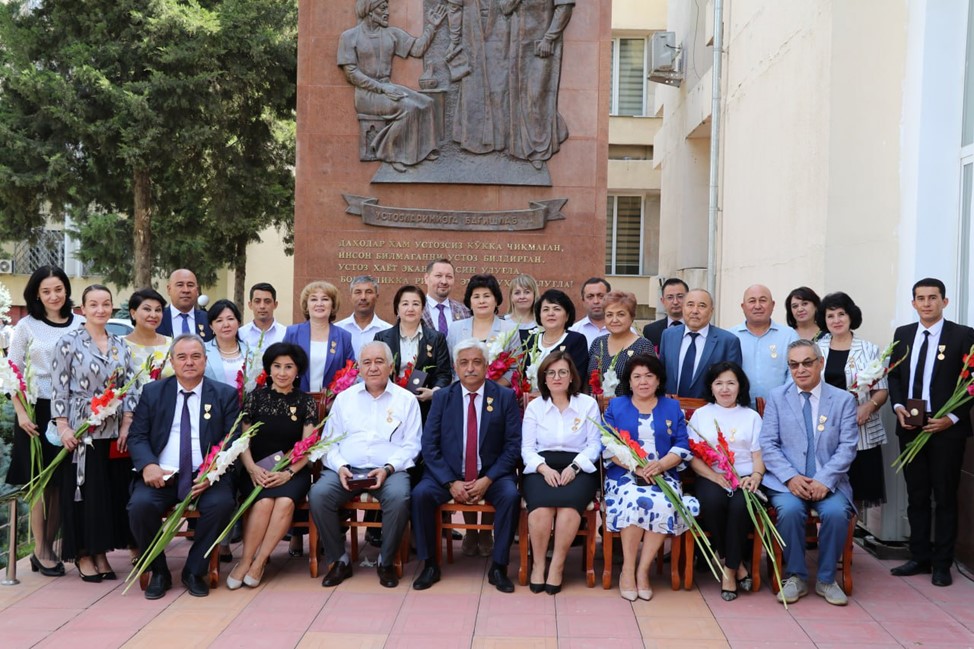CENTER FOR THE DEVELOPMENT OF PROFESSIONAL QUALIFICATION OF MEDICAL WORKERS
“Peace and health are invaluable blessings that cannot be measured or compared with anything for every person and for our entire nation.”
Sh. M. Mirziyoyev
The Center for the Development of Professional Qualification of Medical Workers (CDPQMW) is the leading scientific, educational, and methodological institution of the Ministry of Health of the Republic of Uzbekistan in the field of continuing medical education and professional retraining.
Historical records show that from the very first steps of its activity, the Republic of Uzbekistan began implementing measures aimed not only at economic development but also at preserving public health and reducing diseases. In a special resolution of the Council of People’s Commissars, it was stated: “The health of the population is a key guarantee of its great physical and cultural strength. Medical assistance, with all its scientific achievements, must serve every individual. It should reach not only urban areas but rural regions as well.”
In May 1926, in order to implement the government’s decision, a congress of employees of the People’s Commissariat of Health and provincial health departments was convened. The congress reviewed urgent public health issues, including improving the activities of republican sanitary institutions to combat malaria, as well as matters related to the prevention of epidemiological diseases.
At that time, only a small number of doctors were sent to the existing institutes for advanced medical training in Moscow, Leningrad, and Kazan. Each training period lasted 15–30 days. Most importantly, the regional characteristics of diseases were not studied there. Due to the increasing need for professional development among doctors of the Central Asian republics, it was deemed necessary and appropriate to organize advanced training for physicians within the republic itself.
In the early 1930s, the necessity arose not only in Uzbekistan but throughout Central Asia to establish a structure for advanced training and postgraduate education for doctors. As a result, the Central Asian Institute for Advanced Medical Training was established.
Based on Order No. 459 of the Presidium of the Central Asian Executive Committee dated June 22, 1932, the Central Asian Institute for Advanced Training of Physicians was founded (later renamed the Tashkent Institute for Advanced Medical Training, and currently known as the Center for the Development of Professional Qualification of Medical Workers).
During the first year of its establishment, all available resources were mobilized to form the activities of the departments, develop the material and technical base, and plan and organize educational and scientific work.
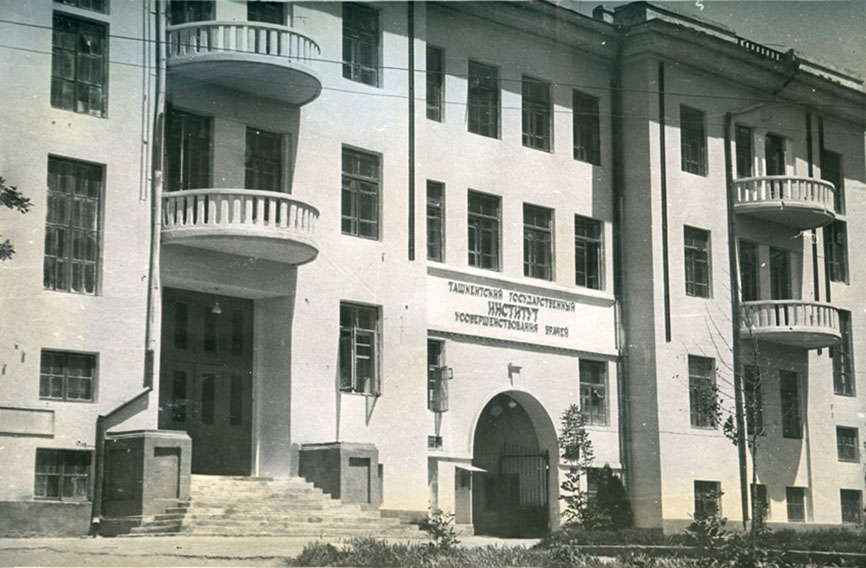
In 1933, postgraduate training began in the six existing departments. That same year, the institute conducted its first advanced training programs, during which 84 physician-trainees improved their qualifications in the required specialties. Each year, new departments were opened, and the number of trainees continued to grow.
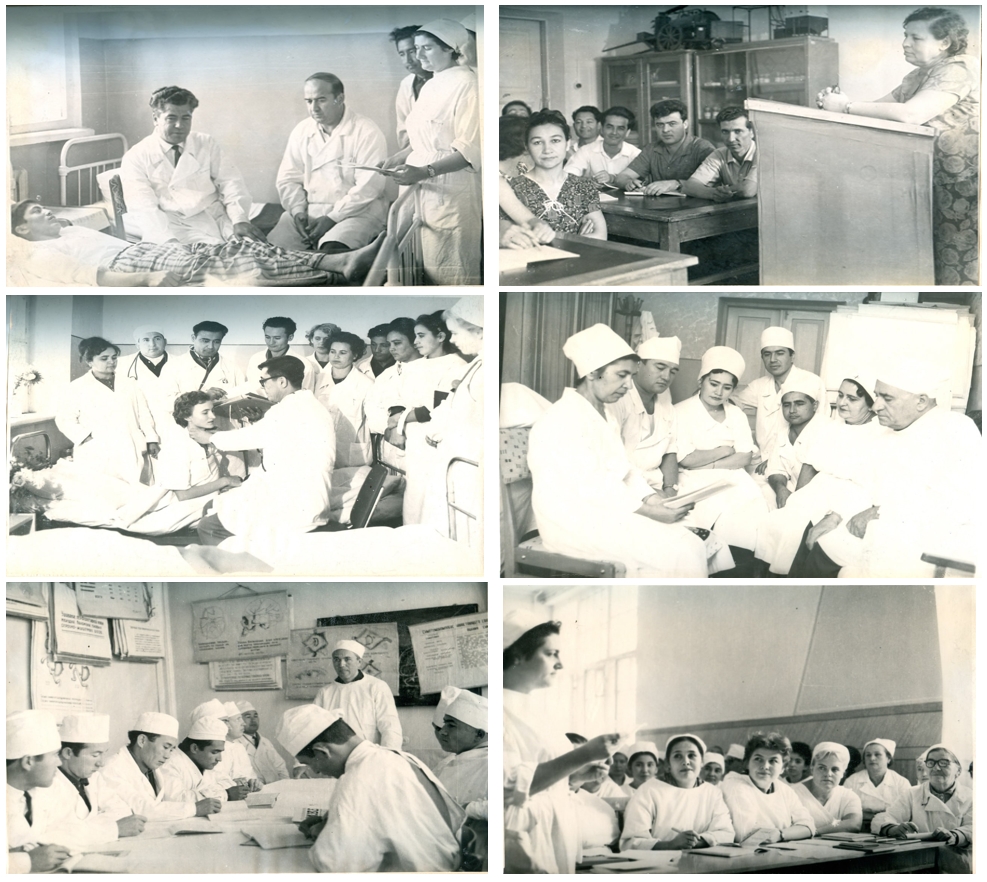
From 1933 to 1940, a total of 1,330 physicians improved their qualifications at the institute.
In 1936, the institute’s fundamental library was established, serving as a scientific, educational, and informational resource center. It provides all trainee physicians and research staff with essential books, as well as classical and foreign medical literature. Today, the library’s collection of scientific and educational textbooks, socio-political and fiction literature exceeds 140,000 volumes.
During the years 1941–1945, the institute’s staff focused their efforts on meeting the demands of the time. The training of medical personnel increased by 5.5 times. A total of 4,585 physicians were trained to meet the needs of the front and evacuation hospitals. In addition, 24 staff members of the institute were direct participants in the Great Patriotic War.
Participants of World War II and Labor Veterans
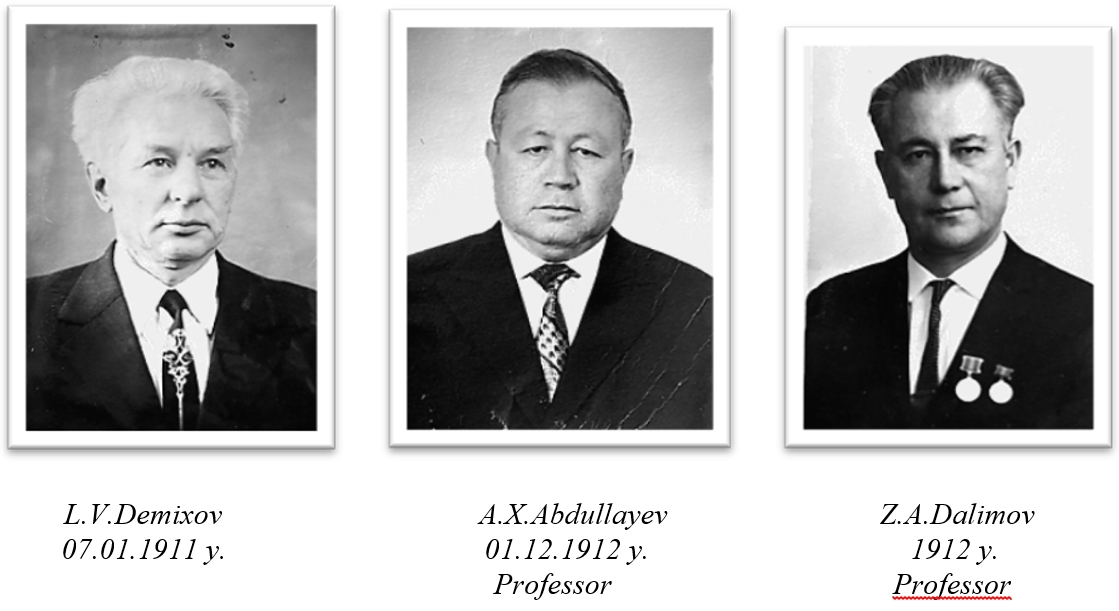
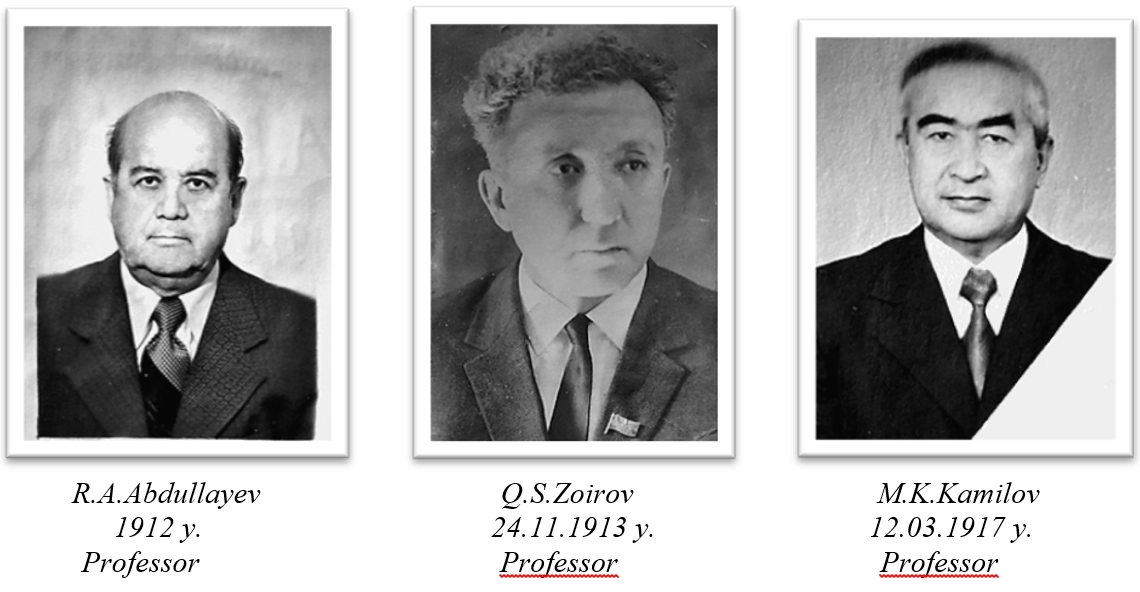
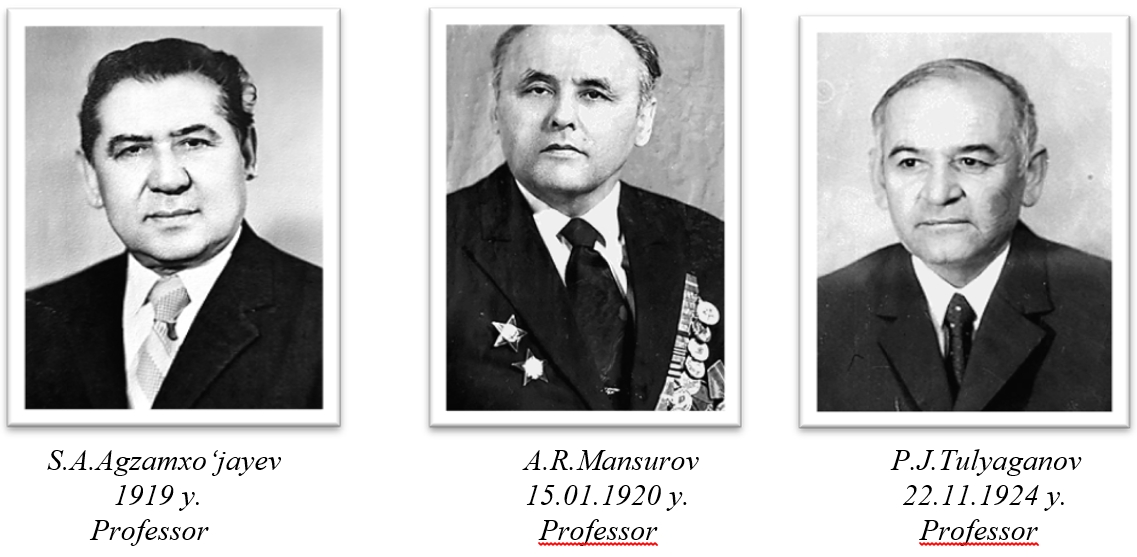
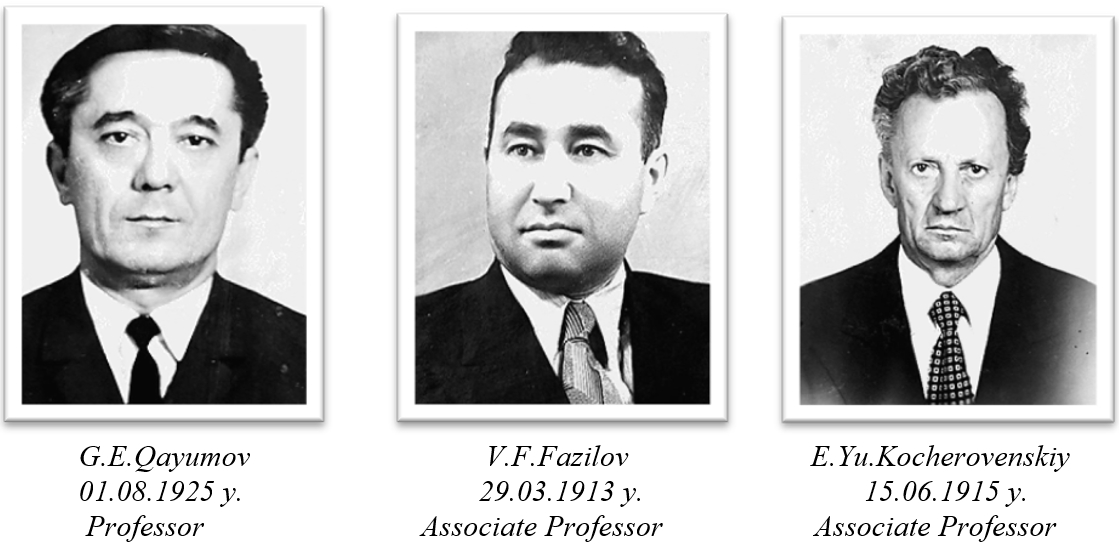
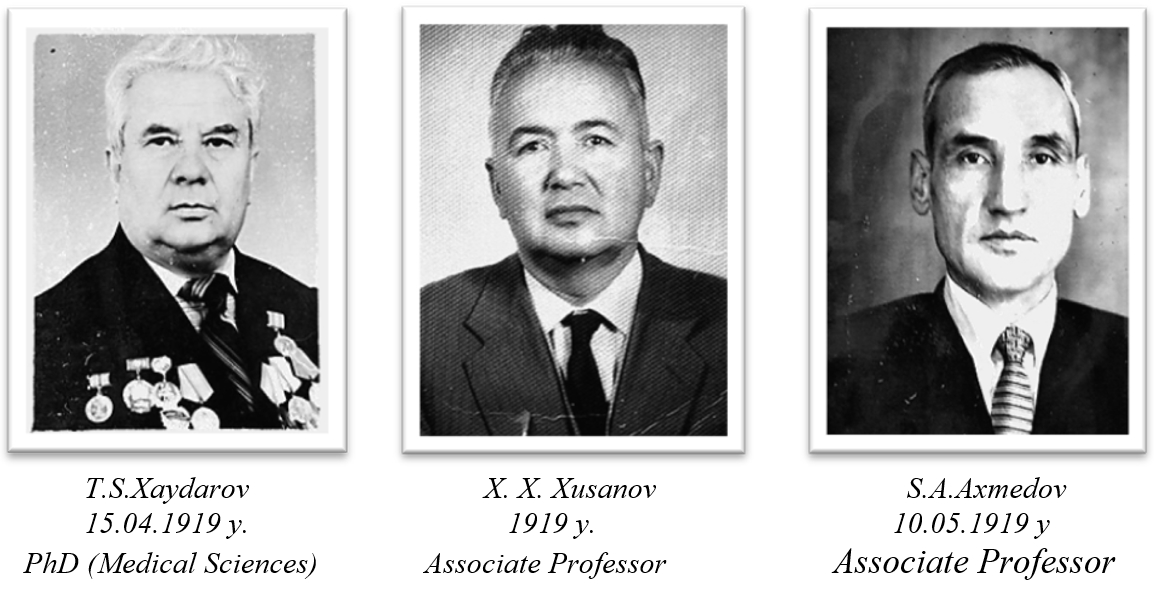
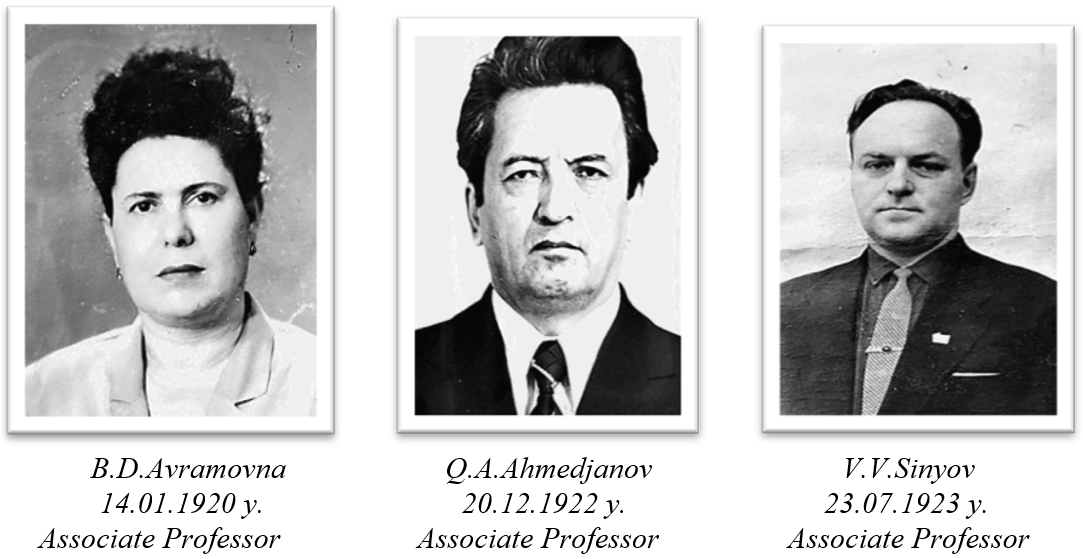
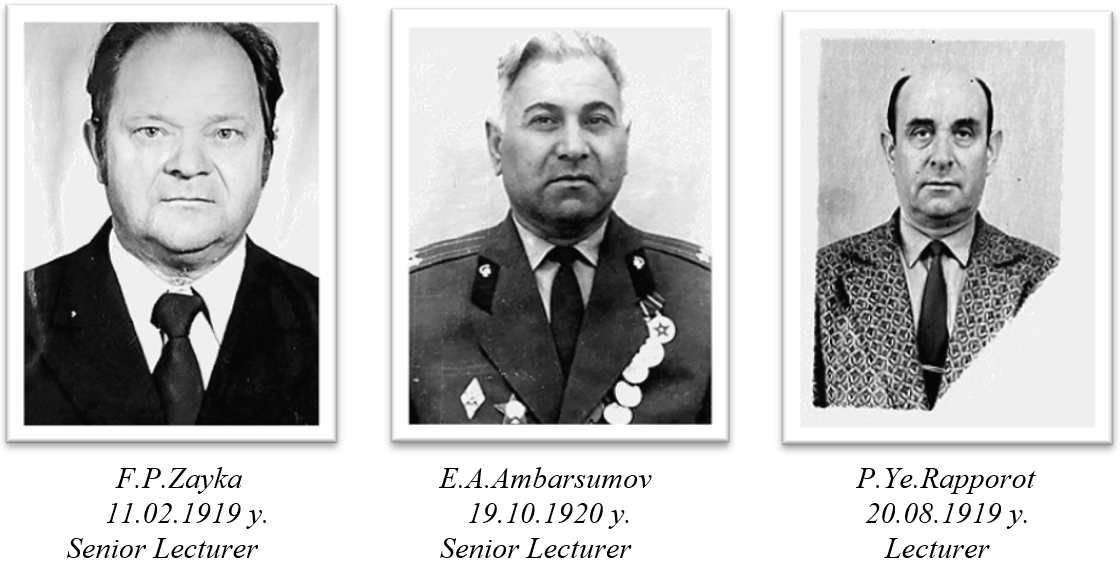
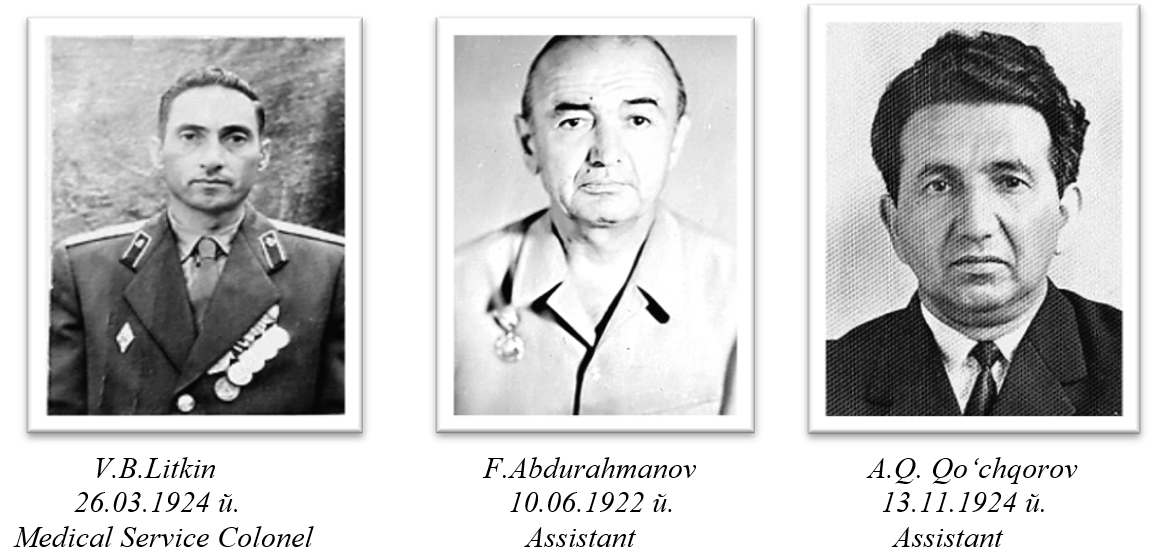
The post-war period, despite certain losses, created opportunities for the Institute to advance scientifically and technically. One after another, new faculties were established, five new departments were opened, and advanced training in new specialties was introduced. Permission was obtained from the authorities to construct a new building for the Institute, and the foundation of the building was laid.
Over the course of 95 years, it would not be an exaggeration to say that the Tashkent Institute for Advanced Training of Physicians has been successfully fulfilling its significant historical mission and transforming its diligent and honorable efforts—aimed at further developing our beloved Motherland—into substantial practical work and real achievements. During these 95 years, ToshVMOI has been recognized as a leading higher educational and scientific institution in the training of highly qualified specialists in postgraduate medical education, and on August 19, 1982, it was awarded the Order of the Red Banner of Labour.
In the National Encyclopedia of Uzbekistan, the following lines are written about this institution: “The Institute serves as a training base for highly qualified medical specialists of the World Health Organization.”
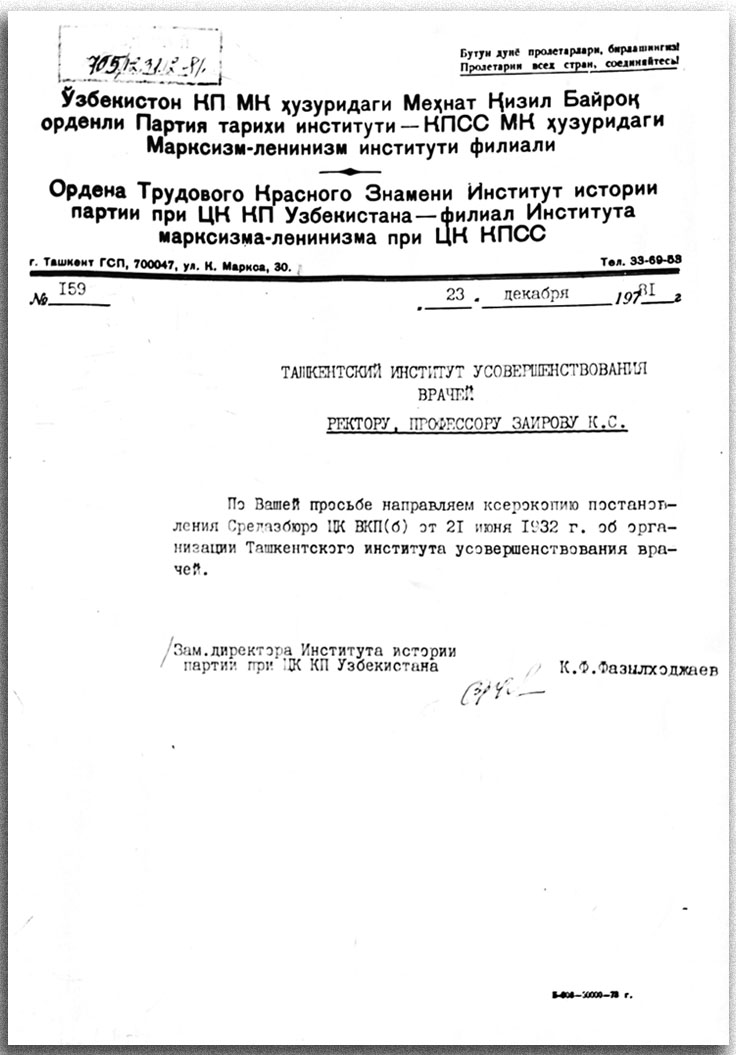
In 1960, 1,024 physicians were trained; in 1965, 2,211 physicians; in 1975, 3,031 physicians; and in 1981, 5,000 physicians completed their training.
From the establishment of the Institute in 1932 until 2017, 11 individuals served in the position of Rector:
- 1932–1938 — Moisey Ilich Slonim
- 1938–1941 — Igron Samuil Markovich
- 1942–1945 — Vidutskiy Moisey Yakovlevich
- 1946–1953 — Jo‘ra Saidovich Po‘latov
- 1953–1957 — Mahamat Bobojonovich Sultonov
- 1957–1960 — Ziyad Aminovich Dolimov
- 1960–1963 — Mannap Atamatovich Mirzamuhamedov
- 1963–1979 — Hamidulla Husanovich Husanov
- 1979–1984 — Qayum Sobirovich Zoirov
- 1984–1997 — Abdumannon Rahmanovich Rahimjonov
- 1997–2017 — Jo‘raboy Ma’rifboyevich Sobirov
- 2017 – present — Akilo Khabibulla Ataullayevich
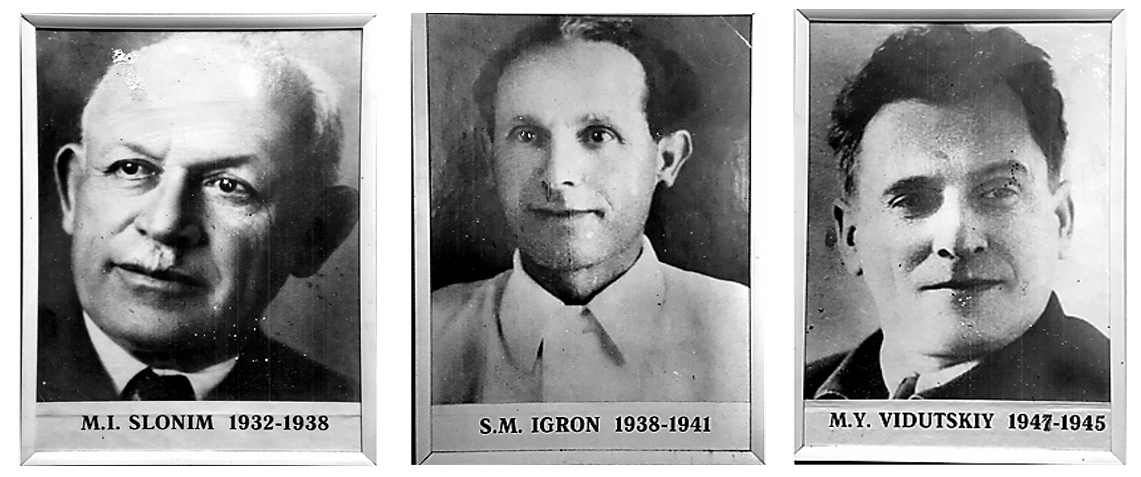
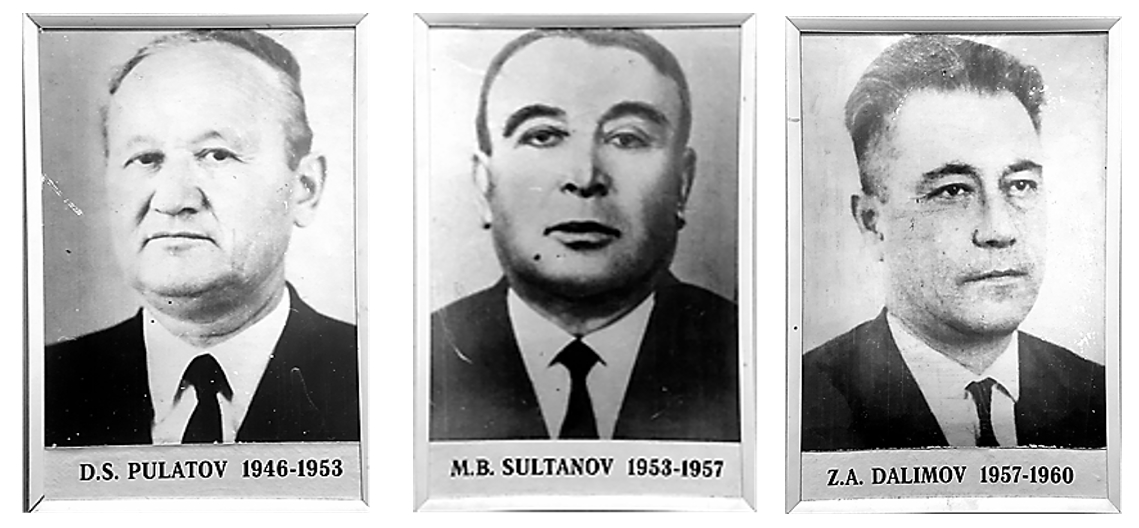
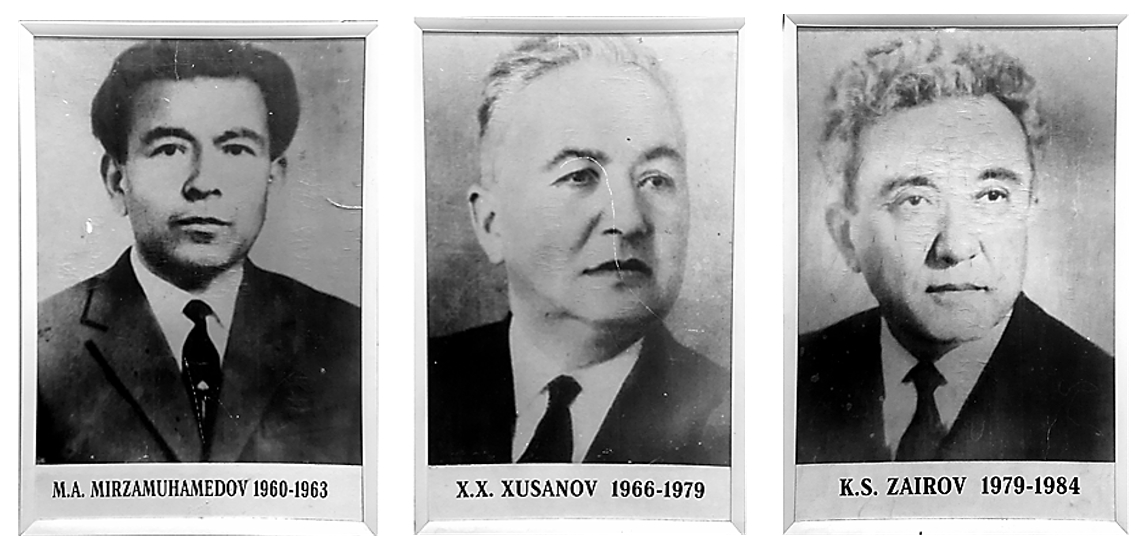
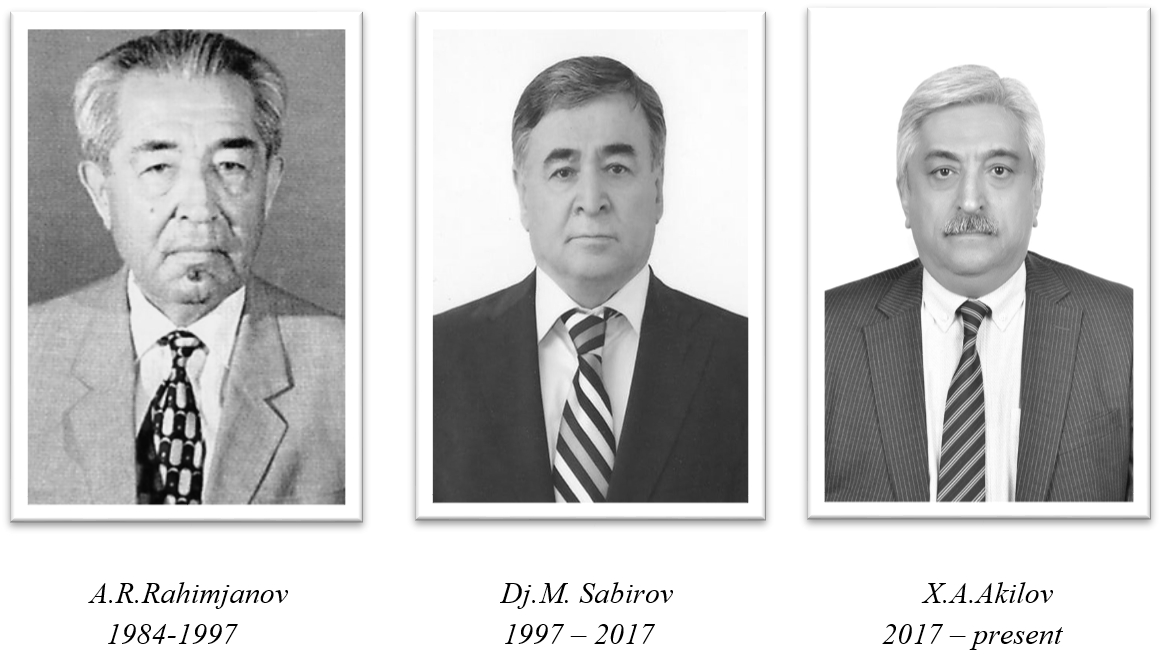
The institute’s staff, keeping pace with the times and responding sensitively to the needs of practical healthcare, promptly and effectively address the issues raised at various stages of postgraduate medical education, while studying and summarizing the experience of other institutions in improving physicians’ qualifications. If in the early years of the institute’s activity the majority of scholars and teachers represented the Russian school, later their ranks were gradually strengthened by local specialists.
In 1963, on the initiative of Qayum Sobirovich Zoirov, the Department of General Hygiene was established at the institute.
On 18 August 1977, by Order No. 796 ("On the establishment of the Department of Pulmonology at TashIUV"), the “Clinical Pulmonology” Department was founded at the Tashkent Institute for Advanced Medical Training.
In 1989, on the initiative of Djo‘raboy Marifbayevich Sobirov, the “Emergency and Urgent Medical Care” Department was established, and he personally headed this department.
In 1992, the Departments of Anesthesiology and Resuscitation and Emergency and Urgent Medical Care were merged.
In 1991, the “Shifokor” dormitory building, constructed in the style of a hotel, was completed and put into operation. According to the project, the building was designed to accommodate students, and currently 703 beds are in use. The total usable area of the dormitory is 12,877 m².
The dormitory is equipped with the necessary facilities and household amenities required for living, studying, and resting in accordance with standard regulations.
In April 1997, Djo‘raboy Marifbayevich Sobirov was appointed Rector of TashIUV. On his initiative, scientific–practical conferences and seminars were held annually in cooperation with leading specialists of our republic as well as scholars from abroad, and newly developed technologies and medicines were introduced into practical medicine.
Since March 2017, Akilov Khabibulla Ataullaevich has been serving as the twelfth rector and continues to work in this position to the present day.
From 2003 to 2017, Akilov Khabibulla Ataullaevich, Doctor of Medical Sciences and Professor, worked as Vice-Rector for Academic Affairs of TashVMOI. From that time until now, he has also been serving as the Head of the Department of Surgery and Pediatric Surgery.
According to Resolution No. PQ-4666 of the President of the Republic of Uzbekistan dated April 7, 2020, “On measures to introduce a completely new system of training and continuous professional development of personnel in the medical and sanitary sector,” the Tashkent Institute for Advanced Training of Physicians was reorganized into the “Center for Professional Development of Medical Workers.”
The Multidisciplinary Clinic of the Center for Professional Development of Medical Workers was established on the basis of the Republican Clinical Hospital No. 1 in Tashkent in accordance with Resolution No. PQ-4666 of April 7, 2020. The clinic serves as a structural unit of the Center and as the main base for teaching clinical disciplines. In addition, it actively participates in organizing the educational process together with department staff, providing specialized medical services to the population, and conducting scientific research in the field of medicine.
To work selflessly for the prosperity of one’s homeland and one’s people means courage and bravery; it means love and loyalty to the motherland, proper upbringing, and leading by practical example. Outstanding scholars who have been fully devoted to their profession, who continued the work of their teachers, trained many worthy students, and rose to the level of mentors who established their own scientific schools — such as the Hero of Uzbekistan, Professor Kh.M. Kamilov; Academician A.M. Ubaydullaev; Academician F.G. Nazirov; Academician S.M. Bahromov; Academician E.I. Musabayev; Academician Kh.A. Akilov; Professor A.I. Ikramov; Professor D.M. Sabirov; Professor D.A. Asadov; Professor B.G. Gafurov; Professor A.A. Fazilov; and Professor U.K. Kayumov; Professor F.S. Shamsiyev — continue to serve as exemplary figures for the younger generation in both medicine and life.


At the same time, we proudly acknowledge and pay respect to M.S. Kasimova, U.F. Nasirova, S.R. Matkarimov, F.I. Khamrabayeva, B.A. Magrupov, S.S. Kariyev, G.T. Iskandarova, Sh.Kh. Saidazizova, A.M. Khadjibayev, D.A. Zareddinov, A.N. Aripov, A.A. Gaybullayev, A.A. Abdukadirov, Sh.Sh. Shamansurov, M.E. Irismetov, M.A. Gafur-Akhunov, E.J. Iskhakov, G.Sh. Khamrayeva, A.Yu. Ibragimov, F.D. Karimova, M.M. Asatova, L.A. Tursunxodjayeva, E.M. Mirdjorayev, N.N. Ubaydullayeva, Sh.B. Irgashev, I.R. Mavlyanov, M.N. Nuritdinov, M.G. Mukhamedova, S.A. Gaffarov, Ya.M. Mamadaliyeva, G.N. Rakhimova, G.M. Tuleboyeva, Q.Kh. Yuldashev, I.M. Akhmedova, A.S. Alimov, R.N. Akalayev, Sh.M. Kariyev, U.Kh. Alimov, D.Z. Mukhtarov, O.A. Aripov, R.K. Salikhodjayeva, N.N. Normurodova, and E.E. Ergashev.
Akilov Khabibulla Ataullayevich, Director of the Center for the Development of Professional Qualification of Medical Workers of the Republic of Uzbekistan, has been awarded the title of “Honorary Professor” by Osh State University of Kyrgyzstan. Doctor of Medical Sciences, Professor, and Academician of the Turon Academy of Sciences of Uzbekistan, Khabibulla Ataullayevich Akilov, Director of Center for the Development of Professional Qualification of Medical Workers (formerly TashIUV), has also been awarded the title of “Honorary Professor” by the Russian Academy of Continuing Medical Education under the Ministry of Health of the Russian Federation. Professor Khabibulla Ataullayevich is also a recipient of the “For Selfless Service” Order, the badge of “Excellence in Healthcare of Uzbekistan,” and the medals commemorating the 10th, 20th, and 25th anniversaries of Uzbekistan’s Independence, as well as Ukraine’s Georgiy “Honor and Glory of Labor” Medal.
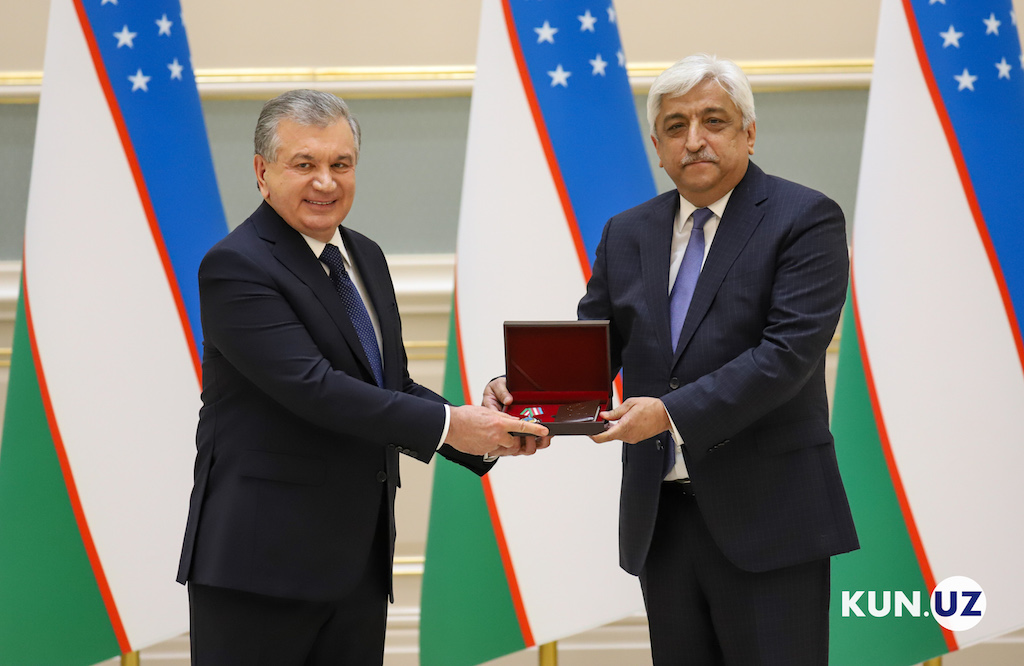
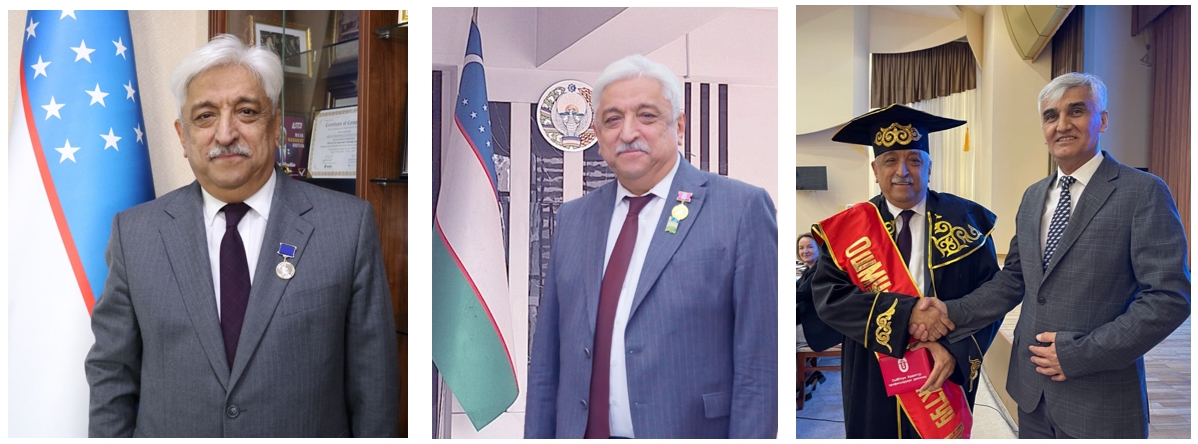
On the eve of the 33rd anniversary of the Independence of the Republic of Uzbekistan, it is a great honor for our Center that Professor Adkham Ilkhamovich Ikramov, Head of the Department of “Medical Radiology,” has been awarded the honorary title “Honored Healthcare Worker of the Republic of Uzbekistan” for his “high achievements in enhancing the intellectual and spiritual potential of our people, his contribution to the development of education, healthcare, literature, culture, the arts and the media, his efforts toward ensuring the progress of our country, strengthening peace, harmony and social stability in society, his significant role in raising the young generation as healthy and well-rounded individuals in the spirit of noble ideas, as well as for his active engagement in public affairs.”

Professor Shuhrat Boisovich Irgashev, of the Department of “Preventive Medicine – Fundamentals of Valeology” under the Faculty of Management, Social and Primary Healthcare at the Center for the Development of Professional Qualification of Medical Workers, has been awarded the “Mehnat Shuhrati” (Labor Glory) Order. This award recognizes Shuhrat Boisovich’s high professional competence in the healthcare sector, his contributions to teaching and scientific activities, as well as his significant role in training medical specialists and supporting their professional development. Additionally, Professor Feruza Ibragimovna Khamrabayeva, Dean of the Therapy Faculty and Head of the Department of Gastroenterology, has been honored with a breast badge “For Contribution to the Development of Medical Tourism in Uzbekistan.” This award acknowledges her dedicated work in the healthcare system and her substantial contribution to the advancement of medical tourism in our country.
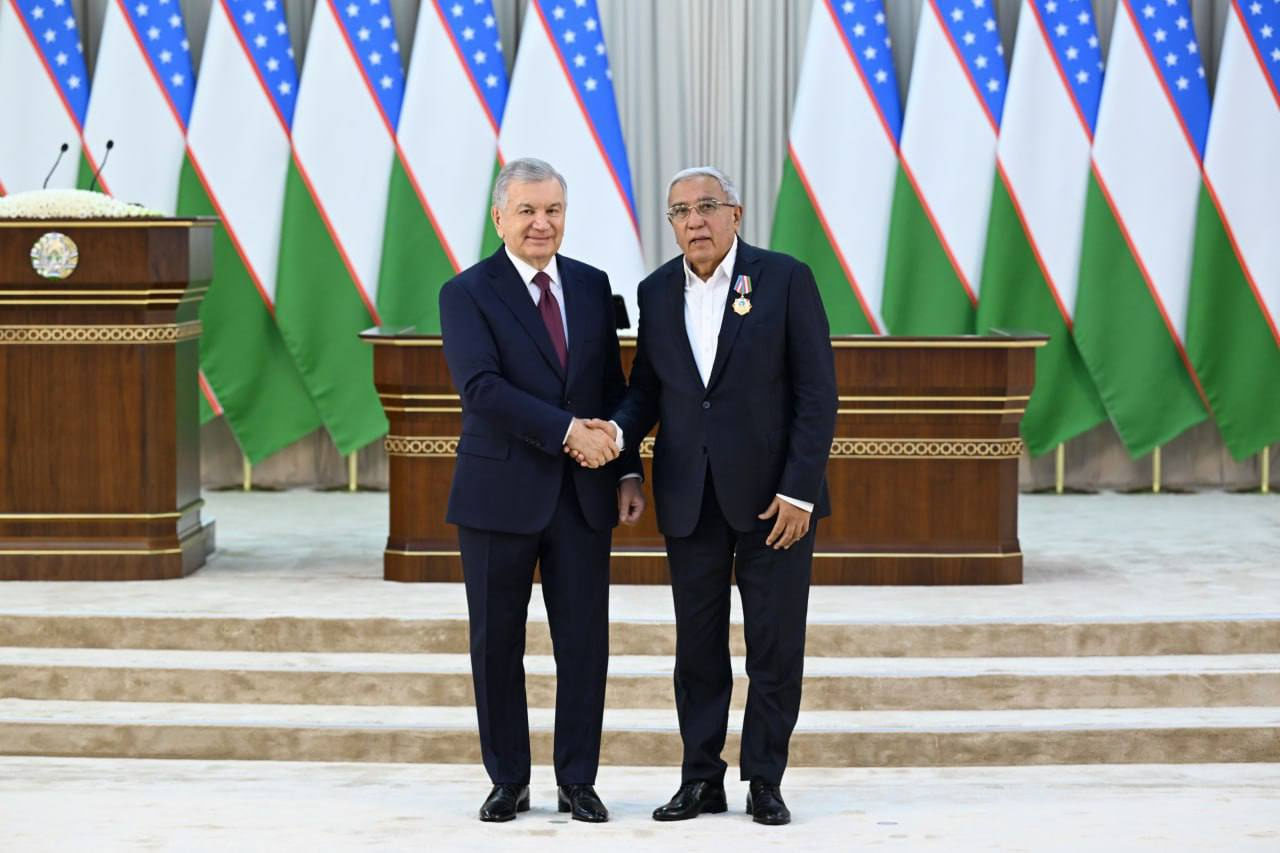
We are proud to announce that among the more than 100 employees of the Center who have been awarded during the years of independence, Professor Kholidjon Makhamadjonovich Komilov, Doctor of Medical Sciences and Head of the Department of Ophthalmology, recipient of the title “Hero of Uzbekistan” and the “Golden Star” medal, is actively working at our institution. In addition, the Center is honored to have among its staff: 1 recipient each of the “For Selfless Service” and “For Service to the Motherland” orders, 4 recipients of the “Labor Glory” Order, 27 recipients of the “Mehr-Sahovat” (Compassion and Kindness) breast badge, 2 holders of the honorary title “Honored Healthcare Worker of the Republic of Uzbekistan”, 50 recipients of the “30th Anniversary of the Independence of the Republic of Uzbekistan” commemorative badge, 1 recipient each of the “Woman of the Year” and “Esteemed Woman” awards, And nearly 40 holders of the “Excellent Healthcare Worker of the Republic of Uzbekistan” breast badge. We take great pride in the dedicated professionals who serve at our Center.
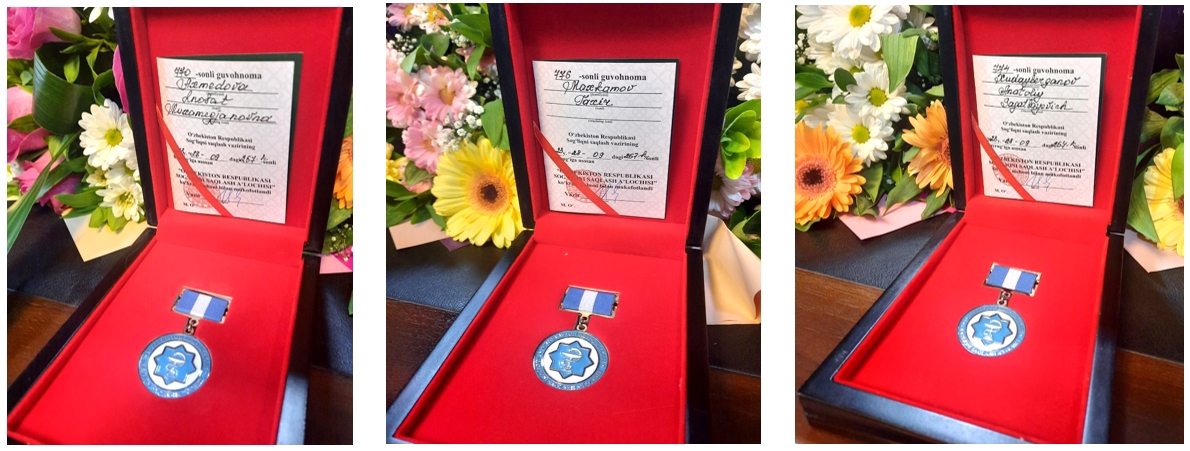
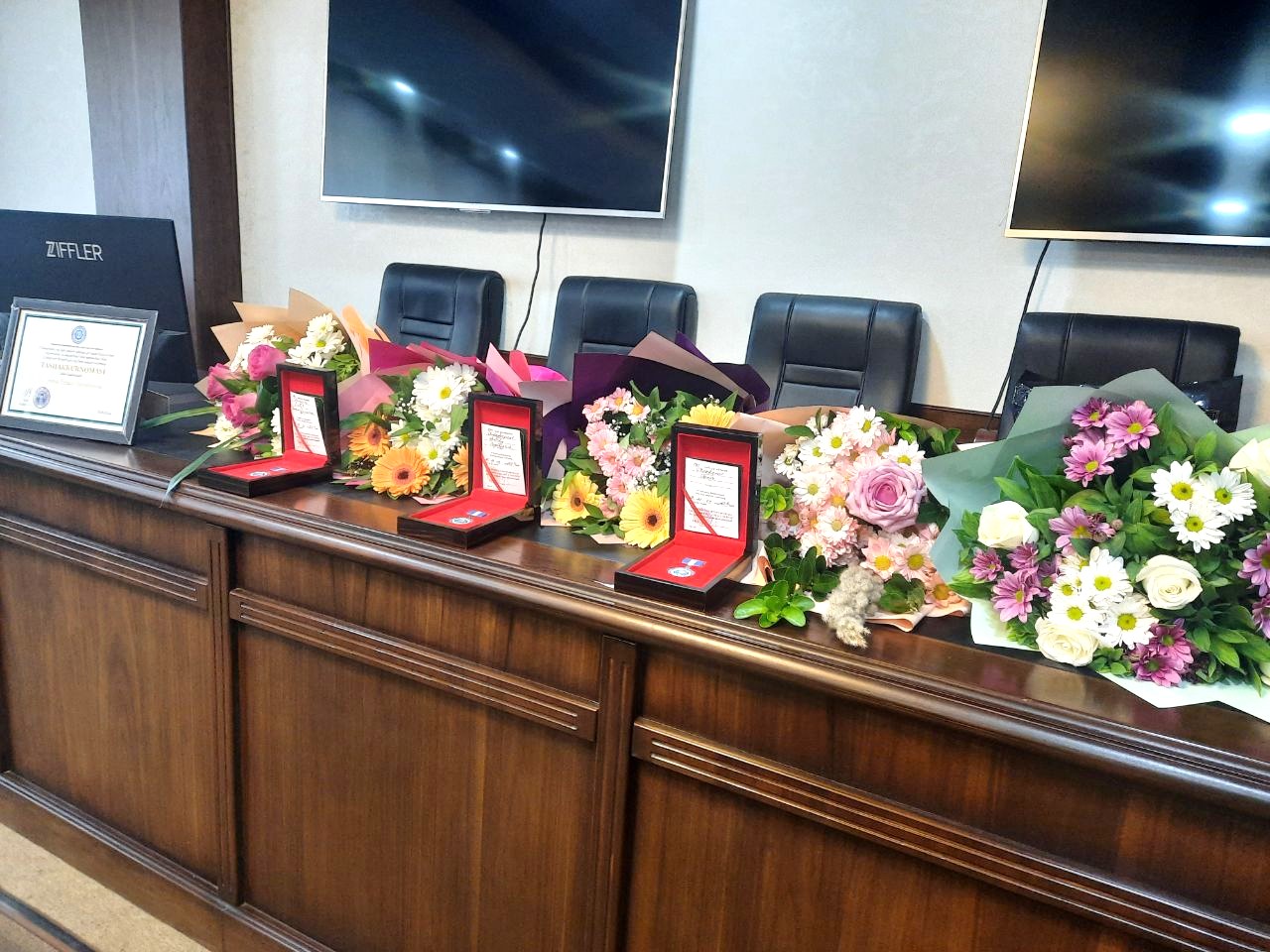
These awards and recognitions serve not only as a great source of pride for the individual recipients but also as powerful motivation for our entire Center. They further strengthen our commitment to improving the quality of healthcare and providing even higher-level services to our people.
Today, the Center operates 5 regional branches (in the Navoi, Namangan, Kashkadarya, Syrdarya, and Jizzakh regions), 5 faculties (“Medical–Preventive,” “Therapy,” “Surgery,” “Pediatrics,” and “Management, Public Health and Healthcare Administration,” as well as the Dean’s Office of Clinical Residency), along with 54 departments and 4 courses.
One of the key components of postgraduate medical education—the clinical residency, which represents the highest form of professional development and advanced training for healthcare personnel—has become one of the most essential parts of Uzbekistan’s multi-level continuous education system during the years of independence. In this regard, the Dean’s Office of Clinical Residency was established at the Institute in 2007.
Today, in carrying out its activities, the Center adheres to the Laws of the Republic of Uzbekistan, Presidential decrees, resolutions, and directives, decisions of the Cabinet of Ministers, as well as orders issued by the Ministry of Higher Education and the Ministry of Health regarding matters related to clinical residency. The main areas of activity within clinical residency include educational-methodological work, scientific research, therapeutic and preventive care, and spiritual-educational initiatives. Over the past 15 years, more than 4,000 young specialists have completed the two-year clinical residency program.
In 2008, the course “HIV/AIDS Issues” was established within the Department of Epidemiology. The head of the course is Doctor of Medical Sciences, Associate Professor K.Yu. Yuldashev. The department operates on the basis of the clinic of the Republican AIDS Prevention and Control Center.
In 2015, the “Surgery-1” Department was established at the Republican Specialized Scientific and Practical Medical Center named after Academician V. Vakhidov. The head of the department is Academician F.G. Nazirov.
In 2015, the Department of Clinical Pharmacology was established. The head of the department is Professor I.R. Mavlyanov, and it is located at the clinic of the 3rd Tashkent Medical Academy.
In 2017, the Faculty of Management, Social and Primary Healthcare was established.
In 2017, the Department of “Nurses with Higher Education” was founded. The head of the department is Associate Professor R.K. Salikhodjayeva.
In 2017, the Department of “Medical Equipment for Innovative Technologies and Engineering Personnel” was established. The head of the department is Associate Professor B.T. G‘ulomov.
In 2018, the Department of “Neurosurgery with the Course of Medical-Social Expertise” was established. The head of the department is Professor Sh.M. Kariyev.
The Center employs 435 staff members, including 4 academicians, 153 doctors of science and professors, 166 candidates of science and associate professors, with an overall scientific potential of 77.1%.
Various organizational and technical formats of distance learning are used, including special websites — the Moodle platform, as well as tele- and videoconferencing or seminar-based formats.
The Center for Professional Development of Medical Personnel has an official website: tipme.uz. Several digital platforms have been created at the Center, such as the cloud-based electronic document database, electronic dean’s office, educational process monitoring platform, and online testing system. In 2006, a modern virtual library composed of electronic versions of books was established, and today unrestricted access to electronic library resources is available.
In 2020, the Center took its first steps in implementing simulation technologies. Based on the Decree of the President of the Republic of Uzbekistan “On measures to further develop higher education” as well as the Decree “On measures to further develop the system of medical and pharmaceutical education and science” and the Digital Uzbekistan – 2030 strategy, the Simulation Center at the CDPQMW (TXKMRM) began its operations. The Simulation Center currently includes 12 rooms, 3 control rooms, 1 server room, and 2 halls.
The introduction of this new form of training begins with short-term training sessions and master classes. The Simulation Center is equipped with advanced high-fidelity simulators, including human-like robotic mannequins manufactured in Germany, Russia, and Belarus, allowing trainees to acquire practical skills. It is also equipped with phantom complexes and manikin simulators that create a realistic illusion of surgical procedures on screen.

Today, continuous education is offered in both full-time (daytime) and distance-learning formats. Distance education is especially convenient for practicing physicians, as it allows them to study lectures at a suitable time without interrupting their work, without spending time or money on travel, and without losing their salary.
Various organizational and technical formats of distance learning are used, including special websites such as the Moodle platform, as well as tele- and videoconferencing or seminar formats.
The Portal of Continuous Medical and Pharmaceutical Education — aimed at fulfilling the Ministry of Health’s Order No. 202 of August 18, 2023, “On measures to implement the continuous professional education portal for improving the qualifications of medical personnel,” and the Center for the Development of Professional Qualifications of Medical Personnel’s Order No. 95-ich of August 22, 2023, “On measures to implement the continuous professional education portal” — led to the establishment of a working group at the Center responsible for creating the “Continuous Professional Education Portal” and developing its tasks. A temporary working team responsible for the portal was formed to ensure its operation and technical support.
The Center has established three journals:
“Salomat bo‘ling” – a popular scientific journal,
“Tibbiyot, ta’lim va innovatsion tadqiqotlar” – a scientific-practical abstract journal,
“O‘zbek Tibbiyot Ilmi va Ta'limi Jurnali” – an electronic journal distributed through the global information network at https://ujmse.uz/
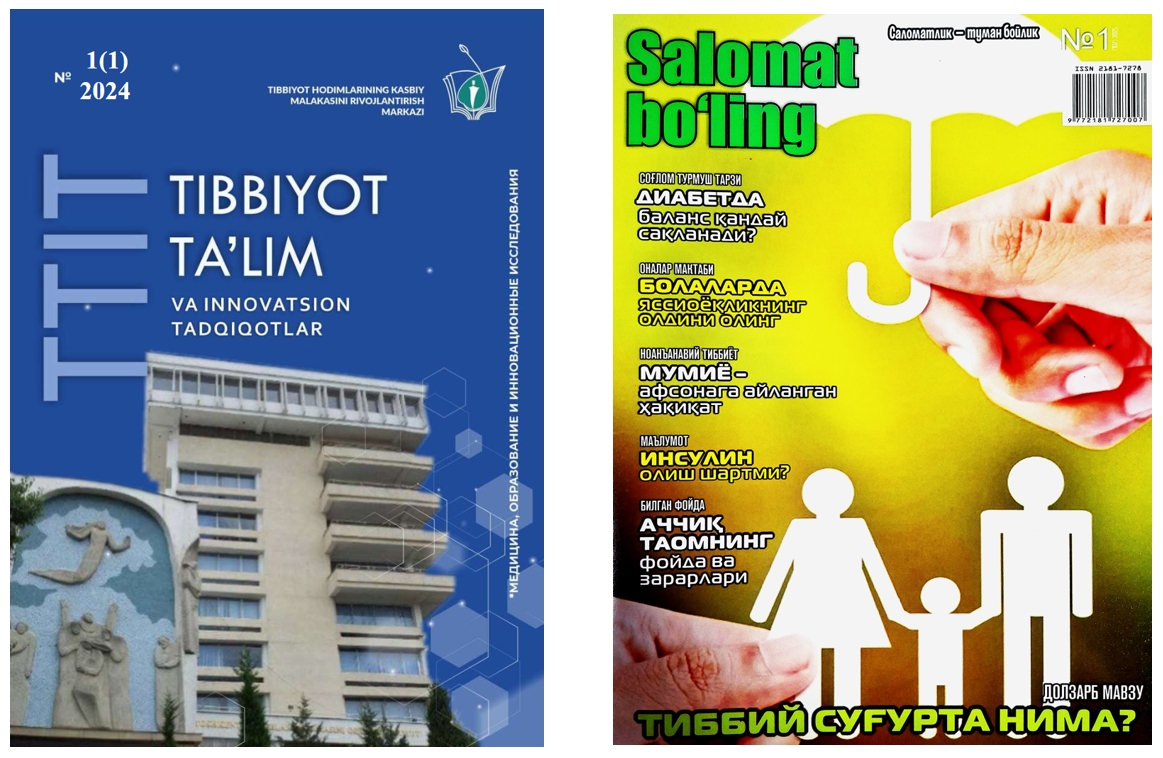
As the Director of the Center for the Development of Professional Qualifications of Medical Workers, Khabibulla Ataullaevich successfully ensured the complete renewal of educational programs based on international standards, the creation of a simulation-based medical training system, the development of a “roadmap” for training medical personnel in accordance with the Development Strategy of the Republic of Uzbekistan, the establishment of international cooperation, and the implementation of innovations.
The Center’s collaboration with other medical institutions plays an important role in its successful activities. There are cooperation agreements with 14 scientific research institutes, specialized medical centers, TTA, ToshPTI, SamDTU medical universities, as well as the international foundations “Sog‘lom avlod”, “Ibn Sino”, and the centers “Bolalarni tarbiyalash” and “Giyohvandlikni oldini olish.”
This year, the Center for the Development of Professional Qualifications of Medical Personnel signed 18 memorandums with foreign institutions from countries such as India, China, Russia, Korea, Turkey, Germany, France, and the USA, including: Apollo Clinic, Antalya Research and Training Hospital, EMU University, Freiburg University, ISRP, IROC AG Institute of Refractive and Ocular Surgery, Center for Disease Analysis Foundation, GIZ, LECTURIO, The First Affiliated Hospital of USTC, KOFIH, the research institute “Mat i Detya,” Osh State University, the Russian Medical Academy of Continuous Professional Education (RMANPO), FGBU “A.V. Vishnevsky National Medical Research Center of Surgery,” “S.N. Fedorov Eye Microsurgery Complex,” and “I.I. Mechnikov North-Western State Medical University.”
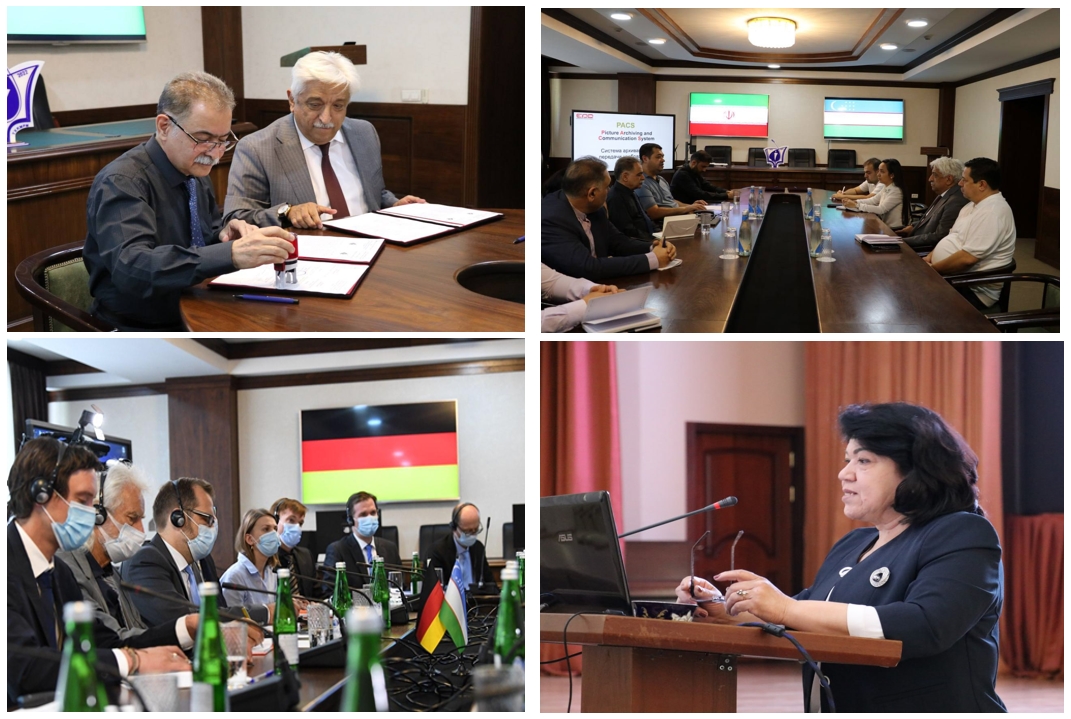
The International Relations Department is the initiator and organizer of the two-stage “English for Medical Professionals” training course. The classes are conducted based on convenient study guides consisting of medical terminology prepared by the staff of the Department of Social and Humanitarian Sciences.
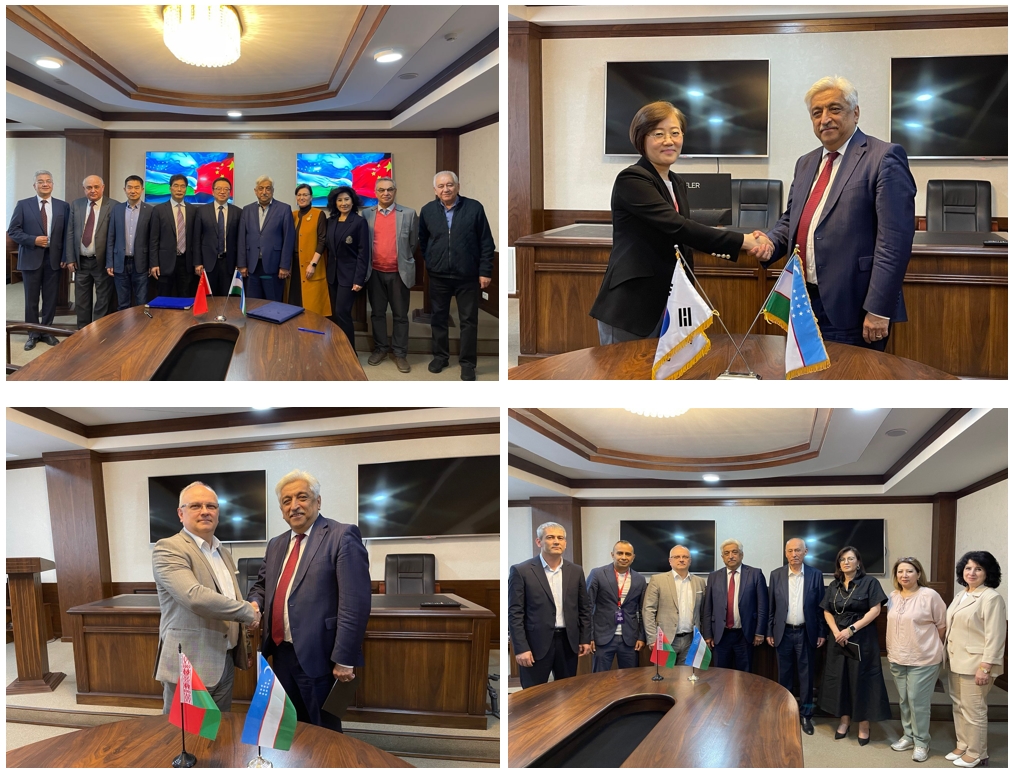
In today’s rapidly changing world, where global competition is intensifying, the demand for highly intelligent and skilled personnel—especially specialists in the field of medicine—is increasing more than ever. Considering the major and responsible tasks we have set before us, the Center for the Professional Development of Medical Workers has implemented fundamental reforms to organize educational activities based on joint educational programs of the Ministry of Health of the Republic of Uzbekistan and foreign partner higher education institutions.
As a result of these efforts, the Center has been awarded the “International Institutional Accreditation Certificate” by the Eurasian Centre for Accreditation and Quality Assurance in Education and Healthcare (ECAQA), confirming compliance with ECAQA standards for institutional accreditation of postgraduate and continuing medical education institutions.
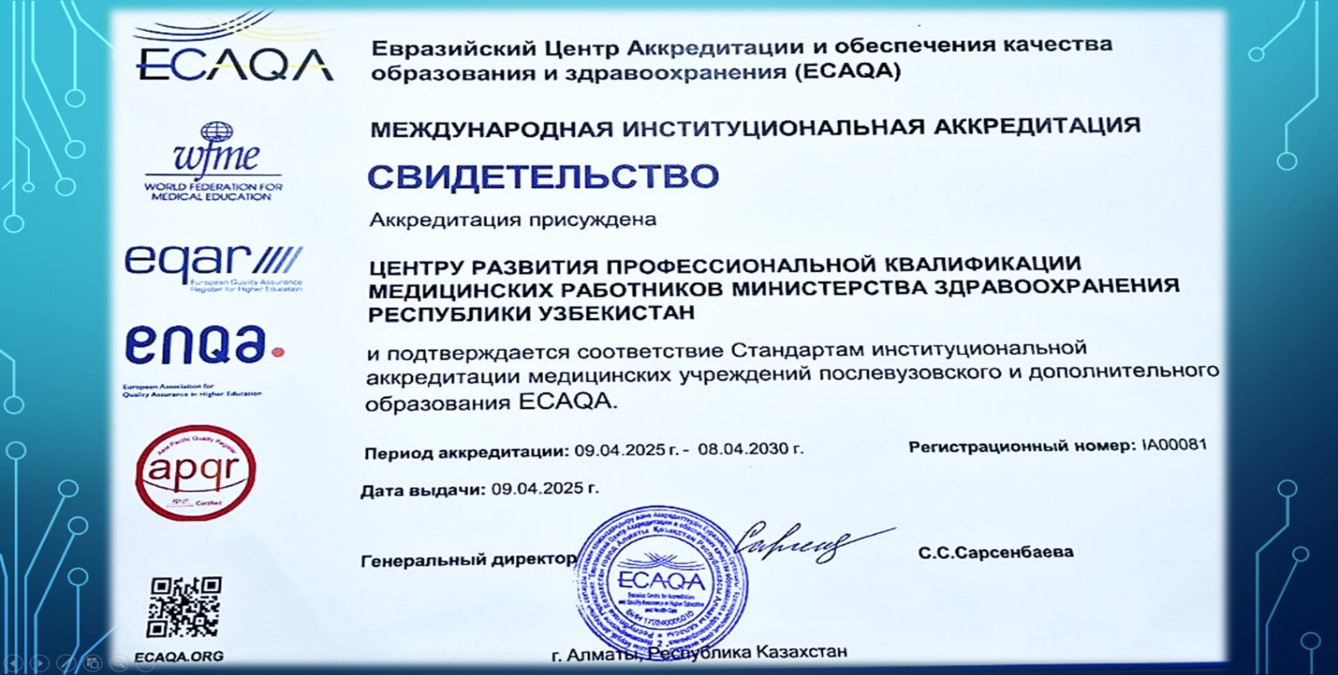
In this regard, fulfilling such a high duty with clear results and practical achievements will become a worthy contribution to the large-scale efforts initiated under the leadership of our esteemed President toward laying the foundation of the Third Renaissance in our country.
On the eve of celebrating the sacred 95th anniversary of our esteemed educational institution, the Center’s team, fully recognizing the great significance of these ongoing processes, is mobilizing all its capabilities to organize an educational system that meets modern requirements—distinguished by convenience, accessibility, continuity, and quality, and most importantly, aimed at meeting the educational needs of medical professionals.
